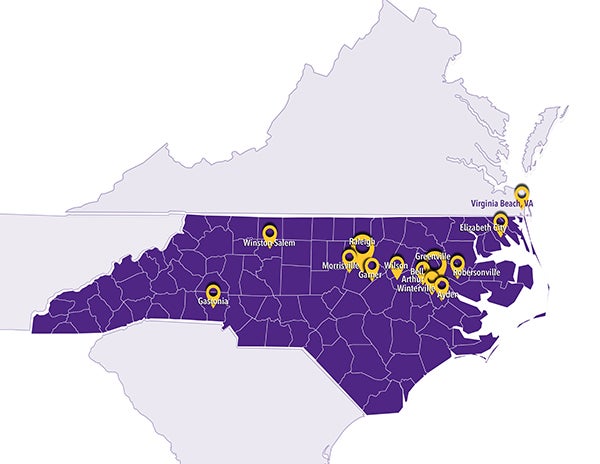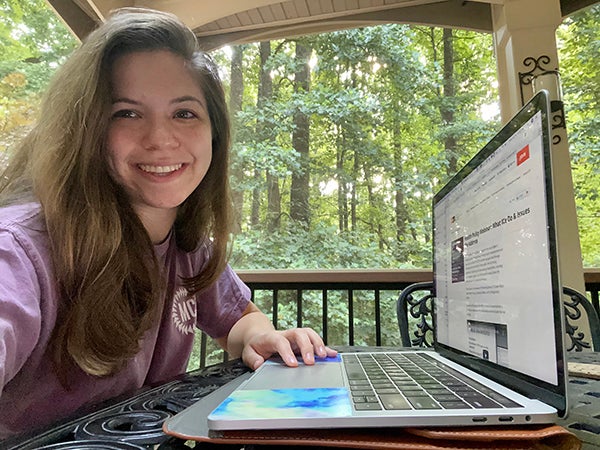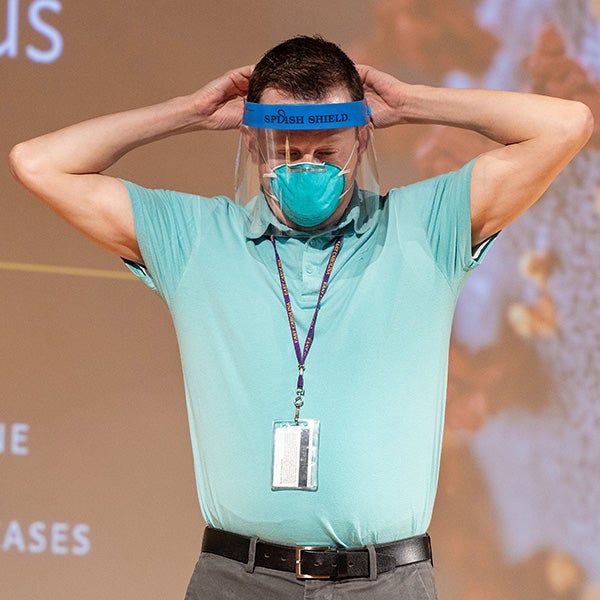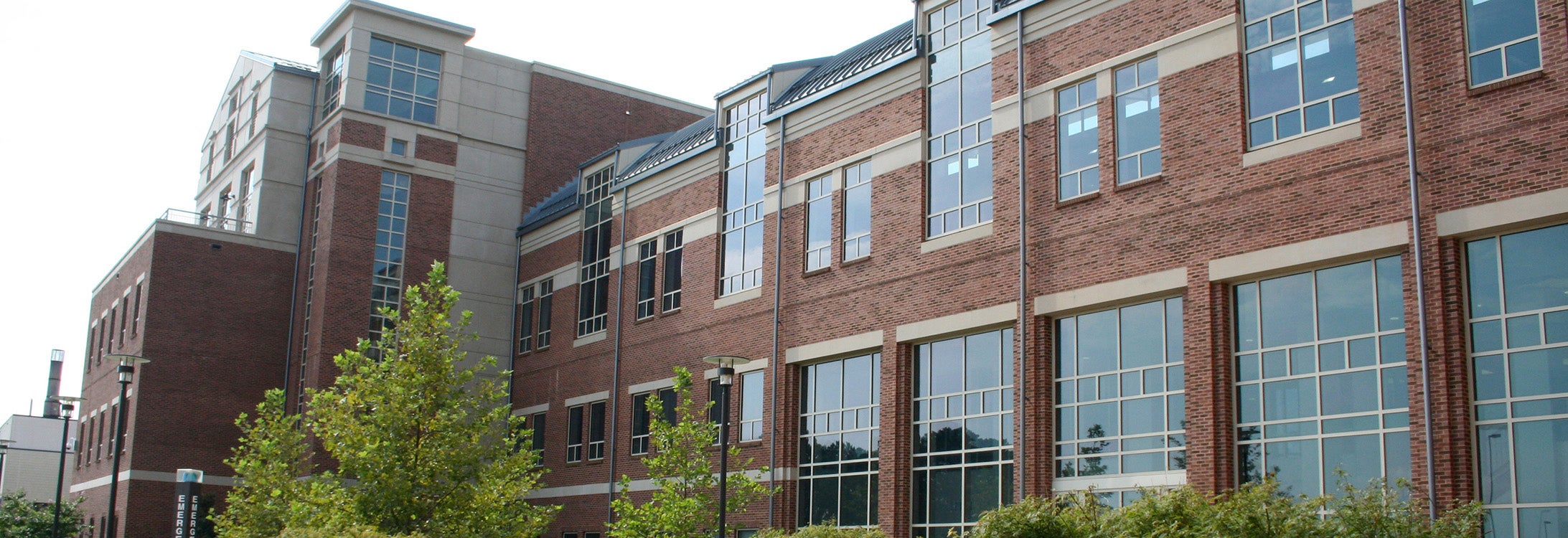LAUPUS LENDS HELP
Health sciences library provides support, resources during pandemic

Throughout the COVID-19 pandemic, Laupus Library loaned laptops to ECU students located in North Carolina and Virginia with their expanded equipment loan program.
Although Laupus Library’s physical doors aren’t open, it continues to fulfill the research, service and informational needs of the health sciences community.
The pandemic forced Laupus to close on March 20, however it maintains virtual support seven days a week for all the same services expected from the library – including literature searching, systematic review preparation, information inquiry, document delivery and 1:1 consultations. Laupus also provides interlibrary loan and document delivery and has offered curbside pickup of circulating collections to faculty, staff and students.
“Now more than ever the need for quality, evidence-based health information is integral to providing care to our community, and Laupus is the leader in this region in acquiring and providing that information,” said Beth Ketterman, director of Laupus Library. “We have developed a robust and accessible electronic collection, so we were able to pivot really quickly to an online service model when the library closed. Our employees are all highly proficient in using online technologies to support our DHS partners, whether in clinics or virtual classrooms.”
Ketterman said the Laupus Liaison Librarians reached out to the health sciences faculty and students directly about special needs and then connect them with health information or resources.
“We knew our students would need to have continued assistance in finding information for research projects, so we made a commitment to remain available seven days a week for them while they made the transition to online learning,” Ketterman said. “We also heard from numerous staff and students that they needed technology in their homes to continue to work and learn, so the library has invested in more laptops and hot spots to ensure that those needs are met.”
The library also produced guidance for copyright interpretation regarding curriculum support, open-access resources on COVID-19 and an instructional and research support YouTube video produced by Jamie Bloss, Librarian Liaison to the College of Allied Health Sciences and the School of Dental Medicine.
“When I started working from home, I was a little worried that the faculty, staff, and students I normally collaborate with would forget about me and the library services, but I was completely wrong,” Bloss said. “I have been contacted by both faculty and students to run literature searches and help them find articles while they are working off campus.”
Bloss said she’s certainly felt needed during this transitional time for our university. She’s completed a wide range of faculty requests including locating resources needed for modifications to in-person internship projects for students, conducting searches on topics like surgically clean air and what design features of a face shield make them most effective against viruses.
“Research projects have in fact ramped up now that people will have more time at home including collaborating on literature reviews and other types of reviews which can be completed working in a team remotely,” Bloss said.
WiFi hotspot loan program keeps education going strong
With the help of Laupus Library’s WiFi hotspot loan program, Carley Overman was able to take her education on the road.
Overman, a second-year master’s student in the College of Allied Health Sciences’ occupational therapy program, needed a change of scenery while still completing course requirements online.
“If I had not been able to check a hotspot out from Laupus, I probably would not have been able to take my vacation as planned because my schoolwork comes before anything else,” said Overman, a Hurdle Mills native. “Thanks to this service that Laupus has provided, I was able to get a breath of fresh air at the beach—taking all COVID-19 precautions, of course—while still completing my educational responsibilities.”

Torri Penna, a master’s student in occupational therapy, said the Laupus hotspot loan offering provided a stress-free connection to her online courses. (Contributed photo)
Although WiFi was offered at the hotel where she was staying, Overman felt the ECU-based service was more reliable for her needs.
“I could have used the WiFi available at the hotel or used the hotspot on my phone,” she said. “I would not have taken that risk, however, considering I needed to take an exam, and those alternatives were not reliable sources of internet connection.”
Overman said she has already recommended the hotspot service to a classmate.
“Laupus’ free hotspot loan service is a lifesaver,” she said. “The checkout process is quick and easy, the setup of the device is straightforward, and the internet provided by the hotspot is flawless. I don’t think enough students know about this service, but it should be taken advantage of.”
In times of on-campus instruction, Overman is a regular visitor to Laupus Library, where she takes advantage of books, the ICE Video Library, printers and study spaces for a quiet place to focus or to work or study with a group. She also often uses the “One Search” feature and PubMed link for her thesis research.
“During normal circumstances, I use Laupus Library almost daily,” she said. “They provide so many services that have been extremely helpful in my education thus far. As students on the Health Sciences campus, we are incredibly lucky to have an abundance of resources provided by Laupus.”
Torri Penna, another master’s student in occupational therapy, said the hotspot she checked out provided a stress-free connection to her online courses. She needed the hotspot for a lab practical while she was in Greenville.
“Having access to the hotspot was critical for my school performance,” she said. “Without it, I would have struggled to connect to my online classes and complete the work that was expected of me. It can be a huge help when needing to complete school work during a tough time, such as having a difficult WiFi connection or needing to complete schoolwork at an alternate location.”

John Baumgartner demonstrates proper PPE use at the Brody School of Medicine. Laupus’ librarian liaison to Brody, Jana Schellinger, was instrumental in a project that addressed PPE shortages. (Photo by Rhett Butler)
Librarian liaison key to N95 mask re-use project
In the spirit of finding solutions to unforeseen problems, Jana Schellinger was happy to step up.
Schellinger, Laupus’s librarian liaison to the Brody School of Medicine, was instrumental in a project that addressed shortages of personal protective equipment—specifically N95 masks needed for direct patient care.
Schellinger and a team of experts explored ways to disinfect N95 masks and return them to their owners for re-use in clinical environments—helping ease the equipment shortages plaguing health care providers nationwide.
Schellinger’s primary task was to research methods and search databases for information that would support methodology and move the project forward.
“I ran some searches in the medical literature, primarily for methods of disinfecting N95 masks,” she said. “They were already focused on vaporized hydrogen peroxide, so I narrowed my searching to that. I also provided articles as they were requested.”
The teamwork involved in the project was key because of the urgency and need to find a solution to the mask shortages. Following the project’s success, another project request led Schellinger to search for articles indicating whether masks should be worn outside of the operating room because it is positive pressure. She was also asked to look up socioeconomic measures for another COVID-19-related endeavor and to research biopsychosocial methods for how providers interact with patients and their families.
Schellinger said the N95 mask re-use project underscored why she does what she does.
“I liked being involved in a project that I knew was making a real difference in the health of our local community,” she said. “It is empowering and humbling. Most of the time, we don’t have a context to what we are doing. People come to us with a need and we do our very best to fill it, because that is what we do and that is who we are. In my mind, however, I always like to think that I am promoting public health through the ripple effect of what I am doing. In this case, that effect was more obvious.”
Writing support programs provide virtual aid
Laupus’s writing support programs also shifted online quickly early on as the pandemic evolved.
Dr. Kerri Flinchbaugh, assistant director of the University Writing Program, began working with faculty on the Health Sciences Campus last September as Laupus Library’s professional writing consultant. The program was created with the goal of offering face-to-face consultations for the first year, followed by virtual consultations as the program evolved.
Those plans rolled out earlier than imagined but have been useful as instruction and interaction shifted online in March.
“The idea of an online writing lab was something we would consider after establishing the presence of the program on campus,” Flinchbaugh said. “Over spring break, we realized we would have to shift to 100% online. I put together a plan, and we began offering synchronous and asynchronous virtual writing consultations.”
Before the shift to an online format, Flinchbaugh was assisting two to three writers per week—and the program’s success hasn’t faltered.
“With the shift to online, I was concerned that faculty writing consultations would decrease,” Flinchbaugh said. “Luckily, they did not. From April to June, I had 19 synchronous consultations focused on a variety of writing projects—grants, research articles, conference presentations, commentary articles, professional blogs, editorials. It is all such interesting and important work.”
Flinchbaugh has also worked with Laupus Research Librarian, Dr. Kerry Sewell to create a new model of a writing accountability group (WAG).
“With Kerry as library support and me as writing support, we decided to make it a virtual WAG,” she said. “We started meeting with the six faculty members from a variety of departments in the health sciences once a week. They are such an amazing group of writers doing such interesting research.”
